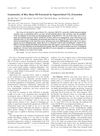 October 2020 in “Veterinary Dermatology”
October 2020 in “Veterinary Dermatology” New treatments and diagnostic methods for various animal skin conditions showed promising results.
6 citations,
January 2019 in “Journal of feline medicine and surgery open reports” A cat with severe skin issues improved with dexamethasone and cetirizine.
18 citations,
August 2013 in “Journal of Feline Medicine and Surgery” Cats can get skin issues from things other than fleas, like insect bites, food, or allergens.
 August 2001 in “Veterinary Dermatology”
August 2001 in “Veterinary Dermatology” The meeting presented findings on effective treatments for various pet skin conditions and insights into the immune responses of dogs with atopic dermatitis.
 3 citations,
May 2018 in “The Journal of the American Animal Hospital Association/Journal of the American Animal Hospital Association”
3 citations,
May 2018 in “The Journal of the American Animal Hospital Association/Journal of the American Animal Hospital Association” Deslorelin implants successfully treated hair loss in two male Keeshonden dogs.
 3 citations,
June 2004 in “Alternative and Complementary Therapies”
3 citations,
June 2004 in “Alternative and Complementary Therapies” The document concludes that hair loss is influenced by genetics and other factors, and while treatments like finasteride can help, they have limitations and side effects.
 104 citations,
November 1978 in “JAMA”
104 citations,
November 1978 in “JAMA” The Protein-Sparing Modified Fast is effective for rapid weight loss and maintaining it, but requires medical supervision and can have side effects.
 9 citations,
November 1978 in “Diabetes Care”
9 citations,
November 1978 in “Diabetes Care” The document concludes that a high-protein, low-carb diet can lead to significant weight loss but requires caution and further research.
 January 2020 in “Asian Journal of Basic Science & Research”
January 2020 in “Asian Journal of Basic Science & Research” Nutrease powder, a high-protein, low-carb supplement, can help manage Polycystic Ovary Syndrome symptoms, regulate periods, improve ovulation, and restore fertility.
 1 citations,
March 2022 in “IntechOpen eBooks”
1 citations,
March 2022 in “IntechOpen eBooks” Collagen is crucial for health and treating certain diseases, and supplements can improve skin, nails, and hair conditions.
32 citations,
May 2017 in “Lasers in medical science” Radiofrequency treatment helps rejuvenate skin by boosting collagen and blood vessel growth.
 November 2024 in “Journal of Scientific Agriculture”
November 2024 in “Journal of Scientific Agriculture” Silk proteins are great for cosmetics because they protect and improve skin and hair while being eco-friendly.
3 citations,
October 2023 in “Cosmetics” Healthy lifestyle changes can significantly improve skin health as you age.
 11 citations,
December 1987 in “Aesthetic Plastic Surgery”
11 citations,
December 1987 in “Aesthetic Plastic Surgery” The document concludes that the hCG protocol may help in obesity treatment and could be scientifically justified, but more research is needed.
 127 citations,
June 2008 in “British Journal of Clinical Pharmacology”
127 citations,
June 2008 in “British Journal of Clinical Pharmacology” Low doses of some substances can be beneficial, while high doses can be harmful or toxic.
 January 1997 in “Elsevier eBooks”
January 1997 in “Elsevier eBooks” The document explains how shampoos clean, rinses condition, one-step shampoos offer convenience, and hair growth promoters aim to prevent hair loss, emphasizing the importance of scientific evidence for their effectiveness.
13 citations,
April 2002 in “International Journal of Toxicology” The safety of placental and umbilical extracts in cosmetics is uncertain, requiring more research.

Eating more protein during weight loss can prevent hair loss caused by not having enough protein.
 December 2021 in “Trichology and cosmetology:”
December 2021 in “Trichology and cosmetology:” Taking Kera-Diet® improves hair and nail health without side effects.

Penicillamine can cause taste problems due to copper loss, which can be fixed with copper or zinc supplements.
3 citations,
September 2014 in “SpringerPlus” Human hair loss may have evolved to help increase brain size.
 3 citations,
April 2022 in “Clinical, Cosmetic and Investigational Dermatology”
3 citations,
April 2022 in “Clinical, Cosmetic and Investigational Dermatology” Different methods, including stress management, healthy diet, supplements, and treatments like minoxidil, can help hair grow back after COVID-19 related hair loss.
 December 2023 in “Journal of Cosmetic Dermatology”
December 2023 in “Journal of Cosmetic Dermatology” The hair growth product was effective and safe, increasing hair growth, thickness, and density while reducing hair fall.
 7 citations,
January 2014 in “Biological & pharmaceutical bulletin”
7 citations,
January 2014 in “Biological & pharmaceutical bulletin” Rice bran oil extracted by supercritical CO2 is considered non-genotoxic.

There are many treatments for common hair loss, but more trials are needed to decide which are best.
 14 citations,
October 2020 in “Natural Products and Bioprospecting”
14 citations,
October 2020 in “Natural Products and Bioprospecting” Various treatments, including FDA-approved drugs, natural products, and oral supplements, can help with hair loss, but a patient's medical history and potential allergies should be considered when choosing a treatment.
 31 citations,
October 2012 in “Dermatologic clinics”
31 citations,
October 2012 in “Dermatologic clinics” Cosmetic hair products are important for hiding hair loss and improving satisfaction when combined with medical treatments.
 May 2024 in “Indian journal of pharmacy and pharmacology”
May 2024 in “Indian journal of pharmacy and pharmacology” Luliconazole is more effective than ketoconazole at repairing damaged hair cuticles.
 43 citations,
January 2013 in “Indian Journal of Dermatology, Venereology and Leprology”
43 citations,
January 2013 in “Indian Journal of Dermatology, Venereology and Leprology” The article concludes that advancements in hair cosmetics require dermatologists to stay informed about products and their potential risks, including allergies and higher risks for hairdressers.
 451 citations,
March 2005 in “Endocrine Reviews”
451 citations,
March 2005 in “Endocrine Reviews” The enzyme steroid sulfatase is linked to breast cancer and other conditions, and inhibitors are being developed for treatment.
























